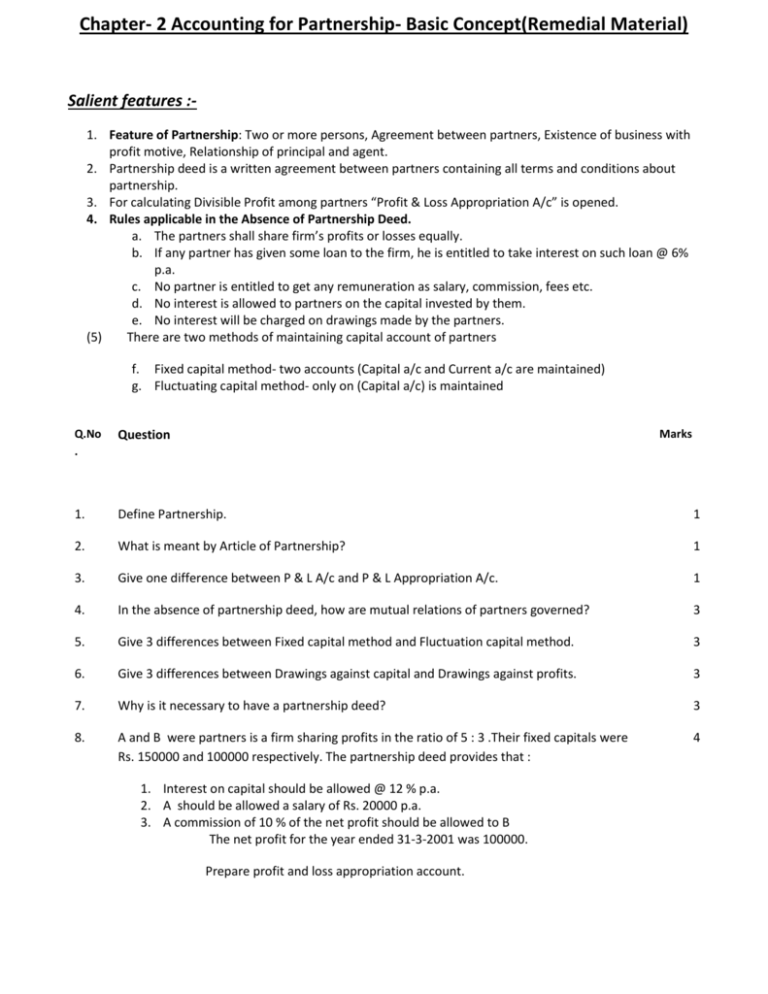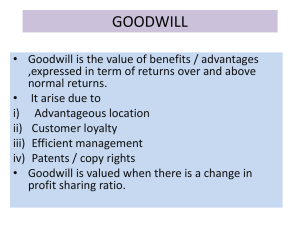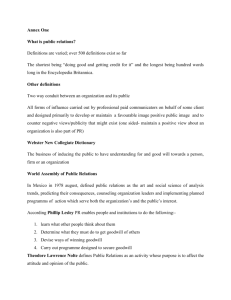Accounting for Partnership
advertisement

Chapter- 2 Accounting for Partnership- Basic Concept(Remedial Material) Salient features :1. Feature of Partnership: Two or more persons, Agreement between partners, Existence of business with profit motive, Relationship of principal and agent. 2. Partnership deed is a written agreement between partners containing all terms and conditions about partnership. 3. For calculating Divisible Profit among partners “Profit & Loss Appropriation A/c” is opened. 4. Rules applicable in the Absence of Partnership Deed. a. The partners shall share firm’s profits or losses equally. b. If any partner has given some loan to the firm, he is entitled to take interest on such loan @ 6% p.a. c. No partner is entitled to get any remuneration as salary, commission, fees etc. d. No interest is allowed to partners on the capital invested by them. e. No interest will be charged on drawings made by the partners. (5) There are two methods of maintaining capital account of partners f. Fixed capital method- two accounts (Capital a/c and Current a/c are maintained) g. Fluctuating capital method- only on (Capital a/c) is maintained Q.No . Question 1. Define Partnership. 1 2. What is meant by Article of Partnership? 1 3. Give one difference between P & L A/c and P & L Appropriation A/c. 1 4. In the absence of partnership deed, how are mutual relations of partners governed? 3 5. Give 3 differences between Fixed capital method and Fluctuation capital method. 3 6. Give 3 differences between Drawings against capital and Drawings against profits. 3 7. Why is it necessary to have a partnership deed? 3 8. A and B were partners is a firm sharing profits in the ratio of 5 : 3 .Their fixed capitals were Rs. 150000 and 100000 respectively. The partnership deed provides that : 4 Marks 1. Interest on capital should be allowed @ 12 % p.a. 2. A should be allowed a salary of Rs. 20000 p.a. 3. A commission of 10 % of the net profit should be allowed to B The net profit for the year ended 31-3-2001 was 100000. Prepare profit and loss appropriation account. 9. A and B are partners in a firm. The partnership deed Provides that interest on drawings will be charged @ 6% p.a. During the year ended 31-12-2006 A withdrew Rs. 2500 at the beginning of the every month and B withdrew Rs.2500 at the end of each month. Calculate interest on the partner’ drawings. 4 10. X, Y, and Z were partners in a firm. On 1-4-2005 their capital stood at Rs. 25000; Rs.12500 and Rs. 12500 respectively. As per the partnership deed : 4 (i) Z was entitled for a salary of Rs. 2500 p.a. (ii) Partners were entitled to interest on capital at 5% p.a. (iii) Profits were to be shared in the ratio of partners’ capital. The net profit for the year 2005-06 of Rs.16500 was divided equally without providing for the above terms. Pass an adjustment entry in journal to rectify the above error. 11. A, B, and C are partners sharing profits in the ratio of 5: 4: 1. Z is given a guarantee that his share of profit in any given year would be Rs. 10000. Deficiency if any would be borne by A and B equally. The profits for the year 1998 amounted to Rs. 80000. Pass necessary entries in the books of the firm. 4 12. S and P started partnership on 01-04-2006 with capital of Rs. 125000 and Rs. 75000, respectively. On 01-10-2006, they decided that their capitals should be Rs. 100000 each. The necessary adjustments in the capitals are made by introducing or withdrawing cash. Interest on capital is to be allowed @ 10 % p.a. Calculate interest on capital as on 31-03-2007. 4 Answers and Solutions of Chapter-2 Accounting for Partnership-Basic Concepts Q.No. Answers and Solutions 1. Partnership is a relationship between persons who have agreed to share the profits of a business carried on by all or any of them acting for all. 2. A written agreement which contains the various terms and conditions as to the relationship of the partners to each other is called the Article of Partnership of Partnership deed. 3. P & L A/c includes all charges against profits whereas P & L Appropriation A/c includes all appropriations of profits. 4. In the absence of partnership deed following rules will be applied for governing the partnership:(1) Profit sharing ratio will be equal. (2) No interest will be given on partners’ capitals (3) No interest will be charged on partners’ drawings (4) No partner will be entitled to any salary, fees, commission or remuneration. 5. 6. 7. Following are the differences between Fixed capital method and Fluctuation capital method. Basis Fixed capital method Fluctuation capital method. 1.No.of Accounts Each partner has two accounts, capital and current account. Each partner has only one account, capital account. 2.Change in balance The capital account remains unchanged unless there is an addition to or withdrawal of capital. The balance of capital account keeps on changing from time to time. 3.Negative balance The fixed capital account of a partner can never show a negative balance. The fluctuation capital account of a partner can show a negative balance. Following are the differences between Drawings against capital and Drawings against profits. Basis Drawings against capital Drawings against profits (i) Where debited It is debited into capital account. It is debited in drawings account. (ii) Part It is a part of capital. It is a part of expected profit. (iii) Effect It reduces the capital. It does not reduce the capital. The three reasons for having a written agreement (partnership deed) are as follows:1. In case of dispute it will serve as evidence in the court of law. 2. Accounts of partnership firm are regulated by those contents. (iii) It regulates the rights, duties and responsibilities of each partner. 8. Dr. P & L Appropriation A/c Cr. To Interest on capital:-A 150000 X 12 % 18000 -B 100000 X 12 % 12000 By P & L A/c (Net profit for the year) 100000 To partner’s salary 2008 To Partner’s commission A 20000 -B (100000-50000) 10 % 5000 To partners’ capital (divisible profit) -A 45000 X 5/8 28125 -B 45000 X 3/8 16875 100000 9. 10. Interest on A’s drawings :- Interest on B’s drawings :- (2500 X 12) 6.5/12 X 6/100 = 975 (2500 X 12) 5.5/12 X 6/100 = 825 M’s capital a/c Dr. 2000 To L’s capital 1500 To N’s capital 500 (For rectifying the past errors.) 11. (i) P & L Appropriation a/c Dr. 80000 To A’s capital a/c 40000 To B’s capital a/c 32000 To C’s capital a/c 8000 (For distribution of profit) (ii) A’s capital a/c Dr. 1000 B’s capital a/c Dr. 1000 To C’s capital a/c 2000 100000 (For deficiency of C) 12. Interest on :S’s capital = 45000 P’s capital = 35000 Chapter- 3 Reconstitution of a Partnership Firm- Admission of a Partner Salient features :- 1. Goodwill is the monetary value of business reputation. It is an intangible asset. 2. Goodwill may be of two types a. Purchased Goodwill b. Non-Purchased Goodwill 3. When existing firm faces problem of limited financial resources and man power then one new additional partner enter into firm. 4. There are three methods of Valuation of Goodwill a. Average Profit Method b. Super Profit Method c. Capitalisation Method 5. When new partner is admitted into existing partnership them existing partners have to sacrifice in favour of new partner, it is called sacrificing ratio. 6. Share of Goodwill of new partner will be credited to sacrificing partners into their sacrificing ratio. 7. At the admission of new partner Profit & Loss on Revaluation of Assets and Liabilities and Balances of Accumulated Profits & Losses will be distributed among old partners (only) in old ratio. Q. No. Question Mar ks 1. What is meant by reconstitution of a Partnership Firm? 1 2. Give one effect of reconstitution of a Partnership Firm. 1 3. Give 2 rights which is got by new incoming partner in the firm. 1 4. What is meant by Goodwill? 1 5. Name 4 factors affecting the value of Goodwill. 1 6. An existing firm’s earned profits for last three are as follows :- 4 Year 2008 2009 2010 7. Profit (Rs.) 200000 (including an abnormal gain of Rs. 25000) 250000 (including an abnormal loss of Rs. 50000) 225000 (Excluding Rs.25000 of current year’s Rent) Calculate the value of fir’s Goodwill on the basis of two years purchase of the average profits for the last three years. (i) L and M are partners in a firm sharing profits and losses in the ratio of 7: 3. They admit N on 3/7th shares which he takes 2/7th from L and 1/7th from M. Calculate the new profit sharing ratio. 4 (ii) P and Q are partners in a firm sharing profits in the ratio of 7:5. They admit R as a partner in the firm. The new profit sharing ratio among P, Q and R is 1:1:2. Calculate the sacrificing ratios. 8. A firm’s average profits are Rs. 35000. It includes abnormal profits of Rs. 25000. Capital invested in the business is Rs. 275000 and the normal rate of return is 10%. Calculate goodwill at four times the super profit. 4 9. Arjun and Bheem are partners in a firm sharing profits and losses in the ratio of 3: 2. They admit Chetan into partnership for 20 %. C brings Rs. 60000 as capital and Rs.20000 as goodwill. At the time of admission of C, goodwill appears in the balance sheet of Arjun and Bheem at Rs.6000. New profit sharing ratio of partner will be 5: 3: 2. Pass necessary entries. 4 10. P and Q are partners with capitals of Rs.52000 and Rs. 44000 respectively. They admit R as a partner with 1/4th share in the profits of the firm. R brings Rs. 52000 as his share of capital. Give journal entry to record goodwill on R’s admission. 4 11. A & B were partners in a firm sharing profits and losses in the ratio of 5:3. On 01-01-2000, they admitted C as a new partner. On the date of admission, the balance sheet of A & B showed a balance of Rs. 8000 in general reserve and debit balance of Rs. 12000 in profit and loss account. Pass the necessary journal entries for the treatment of these items on C’s admission. 4 12. X, Y and Z are partners sharing profits and losses in the ratio of 2:3:5. On 31-12-2000 their balance sheet was as follows :- 8 Balance Sheet as on 31-12-2000 Liabilities Rs. Capital :- Assets Rs. Cash 9000 7000 X 18000 Bills Receivable Y 22000 Stock Z 26000 22000 66000 Debtors 21000 Machinery Creditors 32000 Goodwill Bills Payable 11000 General Reserve 47000 10000 7000 116000 116000 They decided to admit A into the partnership on the following terms:2009 2010 2011 2012 2013 Machinery is to be depreciated by 15 % Stock is to be revalued at Rs. 24000. X, Y and Z have a joint life policy whose surrender value is Rs.6000. Outstanding rent is Rs. 950. A is to bring Rs. 3000 as goodwill and sufficient capital for a 2/5th share in the total capital of the firm. Prepare Revaluation A/c, Partners Capital A/cs and Balance sheet of new firm. 13. X and Y were partners in a firm sharing profits in 3:1. On 01-01-2000 They admitted Z as a partner for 1/4th share in the profits. Z was to bring Rs. 30000 for his capital. The Balance Sheet of X and Y on 01-01-2000 was as follows :Balance Sheet as on 01-01-2000 Liabilities Rs. Assets Rs. 8 Creditors 35000 Land & Building Capitals :X 25000 Y 40000 Plant & Machinery 35000 Stock 15000 65000 Debtors Less-Provision for doubtful General Reserve 20000 17500 500 17000 5000 Investments 13000 Cash 5000 105000 105000 The other terms agreed upon were :1. 2. 3. 4. 5. Goodwill of the firm was valued at Rs. 12000. Land and Buildings were valued at Rs.32500 and Plant and Machinery at Rs.30000. Provision for bad doubtful debts was found in excess by Rs. 200. A liability of Rs. 600 included in Sundry Creditors was not likely to arise. The capitals of the partners be adjusted on the basis of Z’s contribution of capital to the firm. 6. Excess or shortfall if any to be transferred to current accounts. Prepare Revaluation Account, Partners’ Capital Accounts and the Balance Sheet of the new firm. Answers and Solutions of Chapter- 3 Reconstitution of a Partnership Firm- Admission of a Partner Q. No. Answers and Solution 1 Whenever there is a change in the existing agreement, it amounts to reconstitution of the partnership firm. 2. Reconstitution of a firm always leads to change in the existing profit sharing ratio. 3. (i) Right of sharing future profits of the firm. (ii) Right of sharing assets of the firm. 4. Goodwill is the value of the reputation of a firm in respect of profits expected in future over and above the normal profits earned by other firms in the same business. 5. Determinants of Goodwill are Favourable location, Efficiency of management, Nature of Business and Market situation. `6. (i) Calculation of AAP:(200000-25000) + (250000-50000) + (225000-25000) 3 = 675000/3 = 225000 (ii) Goodwill = AAP X No. of year’s purchase = 7. (i) New PSR 29 : 11 : 30 8. (i) AAP = 35000-2500 = 32500 225000 X 2 = 450000 (ii) Sacrificing Ratios are 2 : 1 (ii) Normal Profit = Capital X NRR = 275000 X 10% = 27500 (iii) Super Profit = AAP – Normal Profit = 32500 – 27500 = 5000 (iv) Goodwill = Super Profit X No of Years’ purchase = 5000 X 4 = 20000 9. (i) Dr. Bank 80000, Cr.Chetan’s Capital 30000 , Cr. premium for goodwill 10000 (ii) Dr. premium for goodwill 10000, Cr. Arjun’s capital 5000 , Cr. Bheem’s Capital 5000. (iii) Dr. Arjun’s Capital 3600, Dr. Bheem’s Capital 2400, Cr. Goodwill 6000. 10. (i) Dr. Cash a/c 52000 , Cr. R’s capital 52000. (ii) Dr. R’s Capital a/c 60000; Cr. A’s Capital a/c and B’s Capital a/c by Rs. 30000 each. 11. (i) Dr. General Reserve 8000; Cr. A’s Capital a/c 5000 ; Cr. B’s Capital a/c 3000 (ii) Dr. A’s capital 7500; Dr. B’s capital 4500; Cr. P&L a/c 12000. 12. (i) Profit on revaluation = Nil (ii) For Cash Goodwill :- Dr. Cash, Cr. Premium a/c 3000; (iii) Dr. Premium 3000; Cr. X’s Capital 600, Cr. Y’s Capital 900, Z’s Capital 1500 (iv) For existing Goodwill w/off: - Dr. X’s Capital a/c 2000 , Dr. Y’s Capital a/c 3000 , Dr. Z’s Capital a/c 5000; Cr. Goodwill a/c 10000. (v)Balances of capital a/cs :- X18000,Y22000,Z26000,A44000 (vi) Cash Balance 56000 13. (i) (vii) Balance sheet total 153950. Profit on revaluation : 8300 (X 6225+Y 2075) (ii) Dr. Z’s Capital 3000; Cr. X’s capital 2250 , Cr. Y’s capital 750 (iii) Balances of adjusted Capital A/cs : X 37225,Y 44075,Z 30000 (iv) Balances of rearranged capitals : X 67500 ,Y 22500 , Z 30000 (v) Balances of current a/cs : Z 30275(Dr.) ,Y 21575 (Cr.),Z 6000 (Dr.) (vi) Cash Balance 35000 (vii) Balance Sheet total 175975 Chapter- 4 Reconstitution of a Partnership Firm- Retirtement of a Partner Salient features :1. An existing partner may wish to withdraw from a firm for various reasons. 2. The amount due to a retiring partner will be the total of :a. his capital in the firm b. his share in firm’s accumulated profits and losses. c. his share of profit or loss on revaluation assets and liabilities. d. his share of profits till the date of retirement. e. his remuneration and interest on capital. f. his share in firm’s goodwill. 3. The ratio in which the continuing(remaining) partners have acquired the share from the outgoing partner is called as gaining ratio. (4) Share of Goodwill of outgoing partner will be debited to gaining partners in their gaining ratio. 8. At the retirement of a partner Profit & Loss on Revaluation of Assets and Liabilities and Balances of Accumulated Profits & Losses will be distributed among all partners (including outgoing partner) in their old ratio. 9. The outstanding balance of outgoing partner’s capital a/c may be settled by fully or partly payment and(or) transferring into his loan account. Q. No. Questions :- Marks 1. What is meant by Retirement of a Partner? 1 2. Give one effect of Retirement of a Partner. 1 3. Give 4 differences between Sacrificing Ratio and Gaining Ratio. 3/4 4. (1) A, B, C are partners in a business and divide profit and loss in the ratio 15: 9: 8 3/4 respectively. C retires. A & B decide to share profits in equal proportion. Calculate the gaining ratio. (2) X, Y, Z were partners sharing profits in the ratio of 5: 3: 2. Y retires , X & Z agree to share future profits in 6 : 4. Calculate gain ratio. 5. Raman, Manan, Naman and Yaman are partners in a firm sharing profits in the ratio of 2 : 2 : 1.. On Manan’s retirement the ngoodwill of the firm is valued at Rs. 45000. Raman, Naman and Yaman decided to share future profits equally. Pass the necessary journal entry for the treatment of goodwill. 3/4 6. Ritu ,Yogesh and Santosh were partners sharing profits in the ratio 1 : 2 : 3 .Their capital balances at the retirement of Yogesh were Ritu 23000 , Yogesh 30000 and Santosh17000 . Yogesh’s capital has to be fully paid in cash and the whole amount is brought in cash by Ritu and Santosh to make their capital thereafter equal. Calculate amount brought in by Rith and Santosh and the total capital of each partner thereafter. 3/4 7. The Balance Sheet of A, B, and C who are partners in a firm sharing profits in the ratio of 2 : 1 : 1 ,as on 31-12-2000 was as under :- 6/8 Balance Sheet as on 31-12-2000 Liabilities Rs. Assets Rs. Creditors 10500 Buildings 50000 A’s Capital 40000 Machinery 25000 B ’s Capital 20000 Stock C ’s Capital 20000 Debtors General Reserve 10000 Less : Provision for bad debts Cash at bank 100500 9000 10000 500 9500 7000 100500 On that date B decided to retire from firm and was paid for his share in the firm subject to the following :1. 2. 3. 4. Buildings to be appreciated by 20% Provision for Bad debts to be increased to 15 % on Debtors. Machinery to be depreciated by 20 %. Goodwill of the firm is valued at Rs. 36000 and then retiring partner’s share is adjusted through the Capital Account of remaining partners. 5. The capital of the new firm is fixed at Rs. 60000. Prepare Revaluation Account, Capital Accounts and the Balance Sheet of the new firm. 8. The Balance Sheet of A, B, and C on 31-12-2009 was as follows :- Liabilities Rs. `Capital :- Assets Rs. P & L Account 15000 A 40000 Land & Buildings 40000 B 40000 Plant & Machinery 28000 C 30000 Motor Car 27000 Creditors 25000 Debtors 24000 Cash 135000 1000 135000 A was retired on 31-12-2009 according to following terms : (i) Land and Buildings to be appreciated by Rs. 10000. (ii) Goodwill to be valued at Rs. 21000 . 3. 4. 5. 6. Plant and Machinery to be reduced to Rs. 23000. Provision for doubtful debtors to be created at 5 % on Debtors. Create a provision of Rs. 1400 for discount on creditors. The sum payable to A be brought in by B and C in such a manner that their capitals are in proportion to the profit sharing ratio. Answers and solutions of Chapter- 4 Reconstitution of a Partnership Firm- Retirtement of a Partner Q. No. Answers and Solutions :- 1. It means leaving the firm by a partner due to old age or change in residence or poor health or misunderstanding with other partners or any other reason. 2. Since it is also a reconstitution of firm and reconstitution of a firm always leads to change in the existing profit sharing ratio. 3. Differences between Sacrificing Ratio and Gaining Ratio are as follows :- Basis Sacrificing Ratio Gaining Ratio (i) Effect Decreases old partner(s) share of profit. Increase the remaining partner(s) share of profit. Old Ratio – New Ratio New Ratio – Old Ratio At the time of admission new partner. At the time of retirement or death of a existing partner. Share of goodwill of the new partner is divided between the old partners in their sacrificing ratio. Share of goodwill of outgoing partner is paid by the remaining partners in their gaining ratio. (ii) Formula (iii) When to calculate (iv) Purpose 4. (i) Gaining ratio 1 : 2 5. (i) Gaining ratio of Naman and Yaman is 1 : 1 (ii) Gaining ratio 1 : 7 (ii) Dr. Naman Rs. 7500 and Yaman Rs. 7500 ; Cr.Manan Rs. 15000 6. Total capital of new firm Rs. 70000, Capital of Ritu and Santosh Rs. 35000 each, Cash brought in by Ritu Rs. 12000 and Santosh Rs. 18000. 7. Profit on Revaluation Rs. 4000; Goodwill : Dr A 6000 and C 3000 ; Cr B 9000; Payment of B’s Capital Rs. 32500, Balances of capital before adjustment : A Rs.41000 and C Rs.20500; Balances of capital after rearranged : A Rs. 40000 ,C Rs. 20000, Bank Overdraft Rs. 27000, Total of new Balance Sheet Rs. 97500. 8. Profit on revaluation Rs. 4500 being partner’s share Rs. 1500 each; For goodwill ; Dr. B & C 3500 each and Cr. A Rs. 7000; Gaining ratio 1 : 1 ; Capital after adjustment A Rs.43500,B Rs.33000 and C Rs. 23000, Capital rearranged B & C 49750 each; Cash brought by B Rs. 16750 and C Rs. 26750; Cash paid to A 43500; Cash Balance Rs. 1000; Balance sheet total Rs. 123800.





